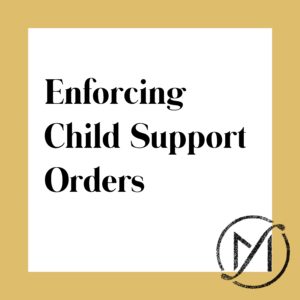Enforcing Child Support Orders

Many people with children worry about enforcing child support orders. Or, in Other words: “What happens if my ex doesn’t pay the child support that the court ordered? And how do I collect back child support?”
Read: on to learn how we address these Post Judgment issues in Connecticut.
Motion for Contempt
The primary means to enforce any divorce court order is via a Motion for Contempt.
Generally speaking, the court doesn’t patrol when people are following its orders, which means you affirmatively need to bring the problem to the court’s attention. We do this by filing a Motion for Contempt. A Motion for Contempt seeks that the court rule that your spouse was in contempt and order your ex to follow the court order.
A Motion for Contempt requires a specific burden of proof to be met by the requesting spouse. In order for the judge to make a finding of contempt, you will need to show by clear and convincing evidence (1) that there is a clear and unambiguous court order, (2) that the order has been violated, (3) that the party who violated the order acted willfully, and finally, (4) you must clearly explain the relief you are seeking from the court.
Read: What is a Motion for Contempt?
Read: What are the Most Common Post Judgment Motions After a Connecticut Divorce?
Attorney Fees and Child Support Contempt and Enforcement
If your Motion for Contempt is successful, the court may award you some or all of your legal fees.
Read: Connecticut Child Support Basics
Other Options for Child Support Enforcement
For some Connecticut families, the Child Support Enforcement Program may be the best avenue to help collect unpaid child support. (Connecticut also refers to unpaid or back child support as an “Arrearage.”) Freed Marcroft’s attorneys can guide you through eligibility for this program, as well as the pros and cons of participating in it.
Read: How Do You Enforce a Divorce Court Order?
Enforcing Child Support Out-of-State Child Support
A law called the Uniform Interstate Family Support Act (“UIFSA”) creates the framework and options for collecting back child support from an out-of-state parent.
Read: How Do I Change My Child Support Payment?
Alternatives to Enforcing Child Support Court Orders
When it comes to child support, we want to flag a few special items. For example, it’s important to know that the Connecticut Child Support Guidelines contain arrearage guidelines. The guidelines dictate how to calculate the amount of the weekly arrearage payment.
Second, for some Connecticut families, the Child Support Enforcement Program may be the best avenue to help collect child support.
Third, the court has some additional means of enforcing its orders on child support. For example, in some circumstances, courts may order a wage execution, or that a child support arrearage be paid from a tax refund.
Child Support Statute of Limitations
Connecticut has no statute of limitations when it comes to collecting back child support. In other words, if you delay filing a Motion for Contempt, you do not waive the right to file one later. That said, the more time that passes, the more likely the parent who is accused of non-payment is to raise a defense based upon “laches,” “estoppel,” or other legal principles.
Read: Do I Have to Pay Child Support if We Have Joint Custody?
Enforcing Back Child Support Over 18
In Connecticut, child support usually continues until a child graduates from high school or turns 19, whichever happens first. But what happens if a parent’s child support obligation ends but that parent still owes unpaid child support? Because Connecticut has no child support statute of limitations, it’s possible for a parent to file for back child support after their child reaches the age of majority.
Read: How Does Child Support Work in Connecticut?
Next Steps
If you have questions or want to learn more about how our team of divorce attorneys can help you with your divorce or Post Judgment issue, please contact us either here or by phone.








